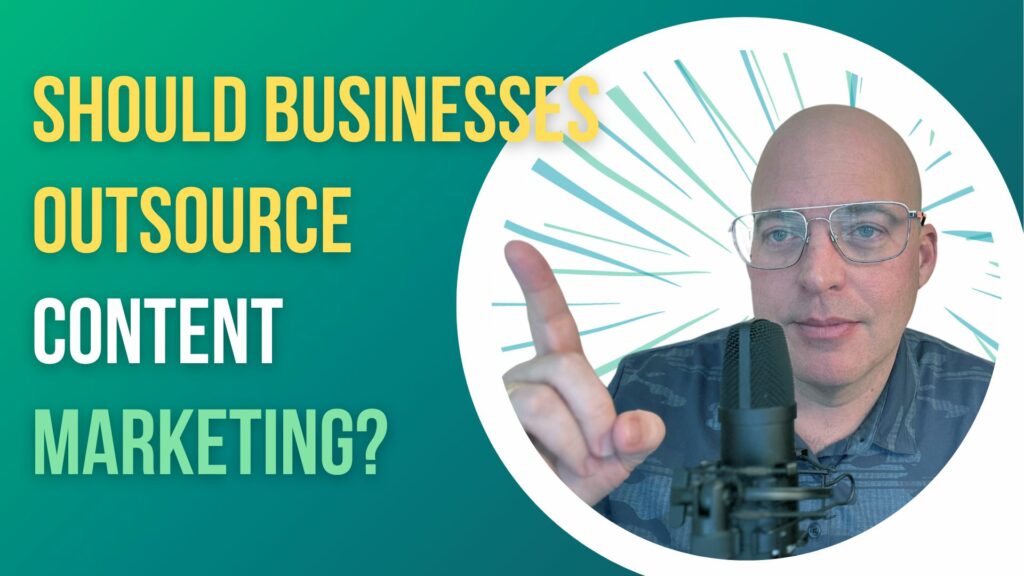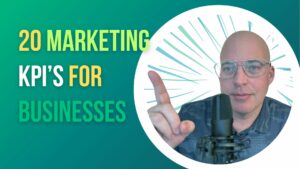Content marketing is a strategic approach focused on creating and distributing valuable, relevant, consistent content to attract and retain a clearly defined audience. Unlike traditional advertising, which directly promotes products or services, outsource content marketing seeks to provide useful information or entertainment to the consumer, thereby building trust and engagement over time.
The Core Dilemma: In-House vs. Outsourcing
Businesses today face a significant decision regarding content marketing: Should they develop content in-house or outsource it to specialized agencies or freelancers? Each option has its own advantages and disadvantages, and the best choice varies depending on factors like budget, business goals, and available skills. The ensuing article will dissect these options to assist businesses in making an informed decision.
By laying out the pros and cons of each approach and incorporating real-world examples and key factors to consider, the article aims to be a comprehensive guide for businesses grappling with this critical decision.
Think of it this way: Choosing between in-house and outsourced content marketing is like deciding whether to cook dinner at home or order takeout. Cooking at home gives you control over the ingredients and preparation methods, but it requires time, skill, and resources. Ordering takeout saves time and offers professional quality but it could be expensive and may not match your preferences. Each has its own set of trade-offs that must be weighed carefully.
Advantages of Outsourcing Content Marketing
Expertise and Specialization
Access to Professionals with a Specific Skill Set
Outsourcing content marketing often allows businesses to tap into a reservoir of specialized skills that might be absent or underrepresented in their in-house team. Content marketing agencies typically employ experts in various fields like SEO, video production, and social media marketing. This provides a broad spectrum of capabilities that can elevate the quality and impact of your content.
Variety of Content Forms
The diversity of skills in an outsourced team also enables various content types, from written blogs and articles to video productions, podcasts, and infographics. With an in-house team, you might need to hire different specialists for each type of content, but an agency usually offers these diverse skills under one roof.
Think of an outsourced team as a Swiss Army knife. You have multiple tools without carrying a separate device for each function.
Cost-Effectiveness
Lower Overhead Costs
Outsourcing eliminates the need for permanent in-house staff for content creation, thereby reducing overhead costs like salaries, benefits, and workspace. This is especially beneficial for smaller businesses that may not have the budget for a full-time content marketing team.
Pay-as-You-Go Model
Many agencies offer flexible payment options, such as project-based pricing or monthly retainers, allowing businesses to pay for services as they are used. This is akin to a pay-as-you-go mobile plan, where you only pay for the services you use, making it a more budget-friendly approach.
Time Savings
Faster Turnaround Times for Projects
Given their specialization and experience, outsourced teams often complete projects faster than in-house teams with multiple responsibilities. This speed can be a significant advantage when capitalizing on timely opportunities or market trends.
Frees Up Internal Resources
By outsourcing content marketing, in-house staff can focus on other core aspects of the business, such as product development or customer service. It’s like hiring a lawn service; while they care for your lawn, you can focus on remodeling your home.
Scalability
Easier to Scale Operations Up or Down
Outsourcing offers flexibility in scaling the amount of content production as needed. It’s easier to ramp up activities during peak seasons or marketing campaigns. Likewise, you can scale down during slower periods without the complexity of hiring or laying off in-house staff. Imagine it like a dimmer switch for your lighting; you can easily adjust the illumination level according to the situation without needing to install or remove light bulbs each time.
Disadvantages of Outsourcing Content Marketing
Quality Control
When you outsource content marketing, you risk inconsistencies in branding and messaging. Different writers and creators could interpret your brand’s voice and messaging in various ways, leading to a disjointed brand experience for consumers. This is analogous to having multiple chefs prepare a single dish; each might add their own flair, making it hard to maintain a consistent flavor.
Risk of Low-Quality Content
While agencies may promise high-quality content, the end product may not always meet your expectations. The quality could suffer if the agency juggles multiple clients or is not fully invested in your brand. It’s like ordering a gourmet meal from a restaurant that’s too busy; the food may not be up to par. Pick a good agency that has your interests at heart.
Communication Barriers
Outsourcing can lead to communication barriers, particularly to agencies or freelancers in different countries. Misunderstandings can occur due to cultural differences or unfamiliarity with specific industry jargon. You could equate this to trying to cook a complex dish using a recipe written in a language you’re not fluent in; the end result may not be what you intended.
Time Zone Differences
Real-time communication can be challenging if your outsourced team is in a different time zone. This can delay projects and make it difficult to make last-minute changes. Imagine needing to consult a doctor for an emergency but finding out they’re available only during hours inconvenient for you.
Limited Influence Over the Creative Process
When you outsource content marketing, you have less control over the creative process. Decisions about content topics, formats, and distribution channels might be made without your input, which can be disconcerting if you have specific ideas or goals. This is similar to commissioning an artist to paint a portrait but not being able to guide their brushstrokes.
Confidentiality Concerns
Outsourcing can also present confidentiality risks. Agencies will have access to your business plans, customer data, and other sensitive information. If proper nondisclosure agreements are not in place, there could be a potential leak of confidential information. It’s akin to entrusting your house keys to a neighbor; while convenient, it does pose a security risk. Pick an agency you can trust
Advantages of In-House Content Marketing
Brand Consistency
An in-house content marketing team allows you to exercise greater control over all elements of your brand, including tone, voice, and visuals. Team members are deeply familiar with the company’s mission and values, enabling them to produce highly aligned content with your brand. This is similar to having a personal chef who knows your dietary preferences and can cook meals tailored to you.
Quick Modifications
With an in-house team, making rapid changes to content is more straightforward. Whether tweaking an ad campaign or updating a blog post, you can expect quicker turnarounds. This is like having a dedicated pit crew for your car; they can make fast, efficient adjustments because they are always at hand and familiar with your vehicle.
Intellectual Property
When you create content in-house, you own it entirely. From idea conception to final production, every aspect of the creative process remains within the company. This eliminates any risk related to licensing or third-party ownership. Consider it akin to writing your own book; the intellectual property, including every chapter and footnote, belongs solely to you.
Disadvantages of In-House Content Marketing
Cost
Higher Overheads Due to Full-Time Employees
Running an in-house content marketing team means you’ll have full-time salaries, benefits, and other overheads to consider. Unlike an outsourced model where you can pay per project or need, in-house teams are an ongoing expense. This is similar to owning a car; you’re responsible for maintenance, insurance, and fuel costs regardless of how often you use it.
Additional Software and Tools Expenses
In addition to staffing costs, an in-house team will likely require various types of software, from project management tools to graphic design programs. These come with their own set of costs. It’s like setting up a home gym; beyond just the equipment, you’ll need to invest in the space’s mats, weights, and possibly even climate control.
Limited Skill Set
May Lack Diversity in Expertise
In-house teams might not have the breadth of expertise that a specialized agency can offer. For instance, you may have great writers but lack video production or SEO skills. Think of this as having a toolbox with only a hammer and some nails; you’ll find it limiting when you need to perform tasks that require a wrench or screwdriver.
Need for Continuous Training
To keep up with the constantly evolving digital landscape, in-house teams require ongoing training and upskilling. This involves additional costs and takes time away from actual content production. Imagine it like caring for a garden; you can’t just plant the seeds and walk away. You must water, fertilize, and prune regularly for optimal growth.
Scalability Challenges
Difficulties in Rapidly Expanding or Shrinking Operations
In-house teams are not as flexible when it comes to scaling operations. If your content needs suddenly increase, you’ll have to go through the lengthy process of hiring new staff. Conversely, reducing staff without layoffs during lean periods might be challenging. This can be compared to owning a large boat; it’s not easy to quickly adjust its size to suit different outings.
Making the Decision: Key Factors
Budget
Your available budget is one of the pivotal factors in deciding between in-house and outsourced content marketing. Look at initial and ongoing expenses to determine which model is financially sustainable for your organization. This is similar to deciding whether to buy or rent a home; each option has its own financial implications and commitments.
Business Goals
Your immediate and long-term business goals should significantly influence your choice. If rapid scalability is a priority, outsourcing might align more with your objectives. On the other hand, if brand consistency and intellectual property are key, an in-house team might be more suitable. Think of this as choosing between different modes of transportation for a journey; each has advantages and disadvantages depending on the destination and the experiences you want along the way.
Skill Availability
Before deciding, take stock of the skills already present within your organization. Building an in-house unit could be the logical step if you have a team that can cover most content marketing needs. However, outsourcing to specialists might be more prudent if significant skill gaps exist. This is akin to a DIY home improvement project; if you have most of the necessary tools and skills, you might not need to hire professionals. But outsourcing is often safer for more complex tasks requiring specialized skills.
Recommendations
A balanced viewpoint is key given the nuanced advantages and disadvantages of in-house and outsourced content marketing. The optimal choice hinges on various factors such as budget, business objectives, and existing skill sets.
Conditions Favoring Outsourcing
Budget Constraints: Outsourcing is often the more economical if you operate on a limited budget and want to avoid long-term commitments. Think of it like using a ride-sharing service instead of buying a car; it’s generally cheaper and requires less financial commitment upfront.
Need for Diverse Expertise: If your content marketing strategy demands a wide array of skills—video production, SEO expertise, graphic design, etc.—that you don’t have in-house, outsourcing provides quick access to such varied expertise. This is similar to hiring a general contractor who can bring in different specialists for each aspect of a home renovation.
Scalability: If rapid scaling—up or down—is a business priority, outsourcing offers greater flexibility. It’s much like using cloud storage; you can quickly adjust the space you need without the burden of physical hardware.
Decision to Outsource
Deciding between in-house and outsourced content marketing is a complex process that involves multiple variables. The choice isn’t black and white, much like choosing between renting and buying a home or deciding on the mode of transportation for a journey. The decision requires a multifaceted evaluation and should be tailored to your business’s unique needs and conditions.
Rather than adopting a one-size-fits-all approach, carefully evaluate each aspect of your situation—budget constraints, business goals, and available skill sets. By doing so, you will be better positioned to make a decision that aligns with your immediate needs and long-term business objectives.








